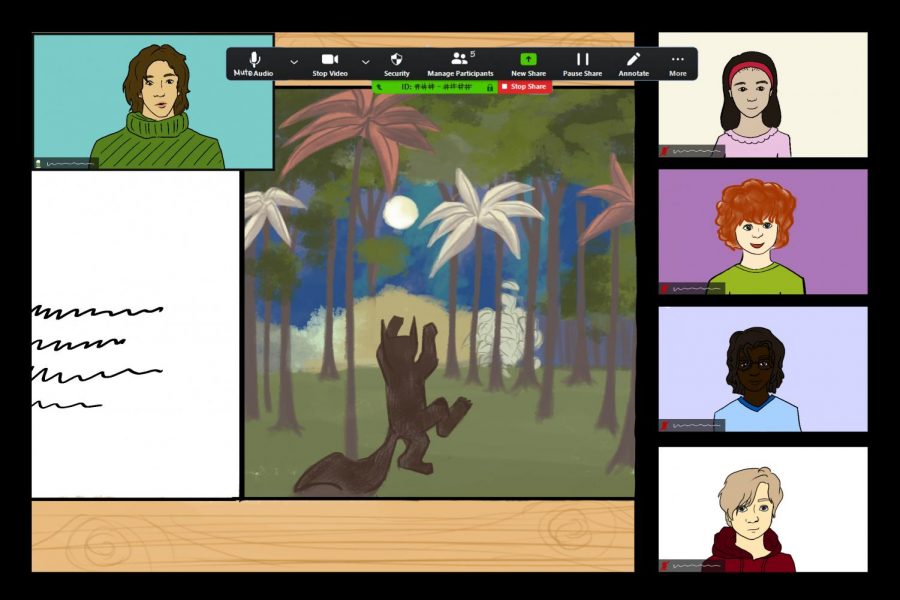For students with disabilities, e-learning fails to replicate in-person attention and support
A teacher reads “Where the Wild Things Are” to a group of students. Social distancing protocols have shifted reading intervention programs intended for students with learning disabilities online.
April 21, 2020
For Jill Calian, a parent to a high school son with learning disabilities, the switch to remote learning has been particularly challenging.
Calian’s son attends The Cove School, a therapeutic day school for K-12 students with learning disabilities. The school has developed a “robust” e-learning program, but she said her son still struggles with the executive functioning and technology skills needed to succeed during online instruction.
“He just requires a lot of supervision to stay on task,” Calian said. “It’s a lot of my time just checking in. I try to be within earshot of him when he’s participating in these Zoom classes so I can hear if he runs into a difficulty or he doesn’t understand something.”
Remote instruction presents unique obstacles for students with disabilities, many of whom rely on physical and occupational therapy, afterschool programs, and other support services difficult to replicate online. Calian is an attorney and board chair of Evanston CASE, a nonprofit that helps families navigate special education services. She said balancing working from home while assisting her son with school can be tough, and it can be particularly difficult for parents without a background in education.
“Many families don’t have the time to be able to sit with their kids,” she said. “They have jobs, or they have multiple children, or they have very young children. That can be quite overwhelming.”
Calian’s son has tried to squeeze in exercise between one-on-one occupational therapy and dinnertime. Meanwhile, statewide school closures have upended plans for athletic afterschool programming intended for students with disabilities. Leonard Woodson, a program coordinator for the city’s Special Recreation division, said the Special Olympics program has “taken a huge beating.”
The first event to go was the State Summer Games swim trials. Scheduled for mid-March, the division canceled the trials when coronavirus cases began to surge. The city cancelled track & field and powerlifting meets next, along with all Special Recreation programming for the months of April and May.
Then, Special Olympics Illinois announced early April that the organization would cancel the 2020 State Summer Games. Statewide, Special Olympics provides programming for 23,316 athletes with intellectual disabilities in 18 Olympic-type sports.
Woodson said closing pools and gyms hinders training for athletes, and cancelling after school activities leaves parents with less time to complete household tasks.
Still, he said protecting the safety of athletes, coaches and volunteers is paramount.
“A lot of athletes and coaches were pretty bummed about it because they’ve been training,” Woodson said. “But you have to think which is more important: to go ahead and compete but end up very ill, or stay safe.”
Short of purchasing equipment, city officials are operating under the assumption that Special Recreation summer camps will go on as planned. The status of summer camps depends on the Illinois stay-at-home order and other safety guidelines, which will become clearer in the coming months, Woodson said.
Some special education services have successfully adapted to distance education. A literacy intervention program, Banner Literacy, typically aids students with dyslexia and other reading disabilities at its Wilmette location. The switch from in-person instruction to video calls has increased instructors’ workloads — they have to prepare and distribute materials to parents in advance of lessons — but maintaining instructor-students relationships has gone smoothly, said Dr. Terrie Briggs, Banner Literacy co-founder.
Briggs said remote services might prove more effective for students with autism than face-to-face learning. Typically over-sensitive to sensory stimuli, these students may concentrate more effectively in their own homes, she said.
“A lot of the stuff in the surrounding environment that bothers them — light, the doors opening or even a phone ringing — is completely gone,” Briggs. “They put earphones on, and they’re way more focused than they used to be.”
But Briggs said school closures might lead to a decrease in academic achievement, which she anticipates will be especially pronounced for students with learning disabilities.
This achievement dip can be especially worrisome for students with disabilities enrolled in non-specialized schools, Calian said. As a student at a private, therapeutic school, her son is likely receiving more instructional time than students in non-specialized schools, she said, and The Cove School has managed to shift therapy and meetings with social workers online.
But at schools that lack such infrastructure, online learning may be especially detrimental — both for students with disabilities and their families.
“This makes us all appreciate the amazing skills of teachers,” Calian said. “[Parents] especially don’t have the skills of special education teachers and therapists. Kids are missing out on that expertise, and there’s a real loss in this situation for those students and a real challenge for families to manage.”
Email: [email protected]
Twitter: @herscowitz












